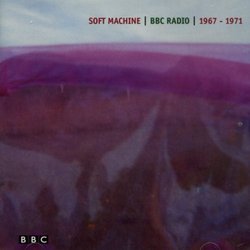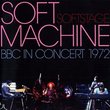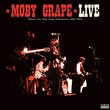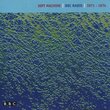| All Artists: Soft Machine Title: BBC Radio: 1967-1971 Members Wishing: 7 Total Copies: 0 Label: Hux Records Release Date: 4/7/2003 Genres: Alternative Rock, Jazz, Special Interest, Pop, Rock, Classic Rock Styles: Experimental Music, Progressive, Progressive Rock, Psychedelic Rock Number of Discs: 2 SwapaCD Credits: 2 UPC: 682970000374 |
Search - Soft Machine :: BBC Radio: 1967-1971
 | Soft Machine BBC Radio: 1967-1971 Genres: Alternative Rock, Jazz, Special Interest, Pop, Rock, Classic Rock
The first volume, of two, in Hux Records release of Soft Machine's complete BBC Sessions. Featuring all the sessions recorded for John Peel's 'Top Gear' program, including several previously unreleased recordings including... more » |
Larger Image |
CD DetailsSynopsis
Album Description The first volume, of two, in Hux Records release of Soft Machine's complete BBC Sessions. Featuring all the sessions recorded for John Peel's 'Top Gear' program, including several previously unreleased recordings including the 1967 session with Kevin Ayers on bass, guitar, & vocals. The running order is mostly chronological but has been tinkered with by Robert Wyatt, 'for reasons of aural satisfaction'. 2003. Similar CDs
|
CD ReviewsShows off Early Softs at most creative! Aging Disgruntled Snob | San Francisco, CA USA | 08/21/2003 (5 out of 5 stars) "I've got a lot of Soft Machine. A lot. And I was thinking this CD would just be another brick in the wall. But the first four tracks alone of this 2-cd set make the price well worth it. Here are Ayers and Wyatt going at it with amazing pop weirdness with Lowry guru Mike Ratledge just laying back. Disk 2 features more of the classic quartet with Elton Dean and the band mostly performing from their "classic" 1970 period. Insert book from Hux Records is first rate with excellent color reproduction of a number of hard-to-find promo shots. If you like the Softs, this is a must have CD." The moment that was the Soft Machine . . . Robert Cossaboon | The happy land of Walworth, NY | 09/22/2003 (4 out of 5 stars) "The Soft Machine, when their star had risen the highest and for one brief perfect period of time, were one of the most exciting, imaginative progressive-fushion bands anywhere on any continent. This two-disc set, for the most part captures the Softs in their ascention and at the peak of their creativity. The first disc is pretty much flawless material for any Soft Machine fan. The first five tracks feature Kevin Ayers; I love the version of Clarence in Wonderland, which would later figure as part of a suite on Kevin Ayers's second solo album. The version of Moon In June here is nearly identical (it probably is the same version) as that on the Peel Sessions. The only tough lemon to swallow for me ws Fletcher's Blemish (which is exactly what that song is!) as it goes nowhere and recalls the worst moments of pointless jazz noodling; for avante garde enthusiasts only. But the best song, hands down, is the 20 minute plus workout of Mousetrap-Esther's Nose Job suite. It's simply amazing, and as Hugh Hopper said in his liner notes, the best jazz they ever recorded. Elton Dean's saxophone on this song, and throughout the rest of this collection, comes across like an ongoing whip-crack, especially on Virtually, the opener for the second disc. The BBC Radio sessions represents the Soft Machine in all their experimental and inventive glory. This, and not the successive albums of banality that came after Third, is how they should be remembered and appreciated." Alternative readings of some of their best loved works Laurence Upton | Wilts, UK | 11/21/2004 (4 out of 5 stars) "Even six sessions for John Peel's legendary Top Gear programme in three and a half years is not enough to demonstrate the speed of the musical developments of this band, who seem by contrast to have been falling into a black hole in subsequent years. Already, by the time of their first session in December 1967 they had changed labels and lost two guitarists (Larry Nolan and Daevid Allen) and become the classic line up of Kevin Ayers, Mike Ratledge and Robert Wyatt.
That first session, produced by Bernie Andrews, caught them at a magic time when they were still song-based and psychedelic, and captured A Certain Kind, Hope For Happiness and Lullaby Letter in very different versions from the officially released counterparts on the LP The Soft Machine, plus two songs unrecorded by the band but later revived by Kevin Ayers and the Whole World: Clarence In Wonderland and We Know What You Mean (aka Soon Soon Soon). Sadly the group recorded no session during the life of The Soft Machine Vol. 2 and by the time they did return to record for John Walters in November 1969, Kevin Ayers had left, and long, dazzling and intense instrumentals had become the order of the day, interspersed with Robert Wyatt's self-deprecating but pithy vocal interjections. The line-up expanded to include a brass section borrowed from Keith Tippett's band and the result was a jazz-rock fusion unlike any other. Pieces like Mousetrap (here in two versions) and Esther's Nose Job still invigorate, but shortly after the last session here, from June 1971, Robert Wyatt left, and when Mike Ratledge too left in 1976 there was no original member left. All the more reason to have these alternative readings of some of their best loved works" |

 Track Listings (15) - Disc #1
Track Listings (15) - Disc #1


